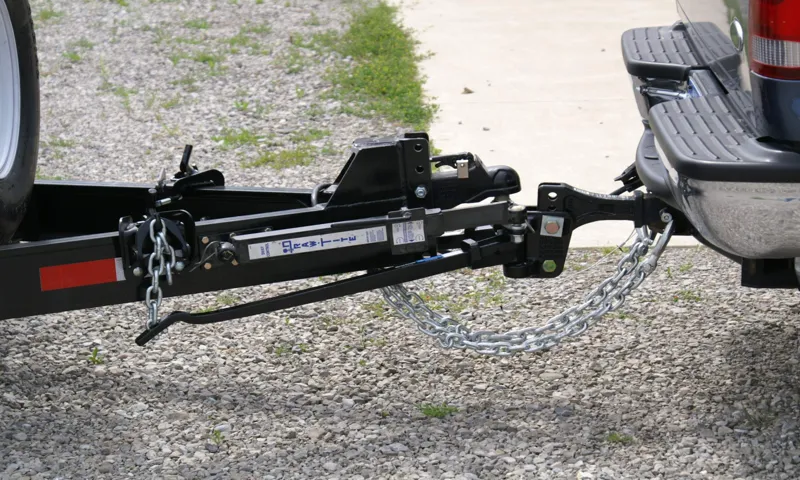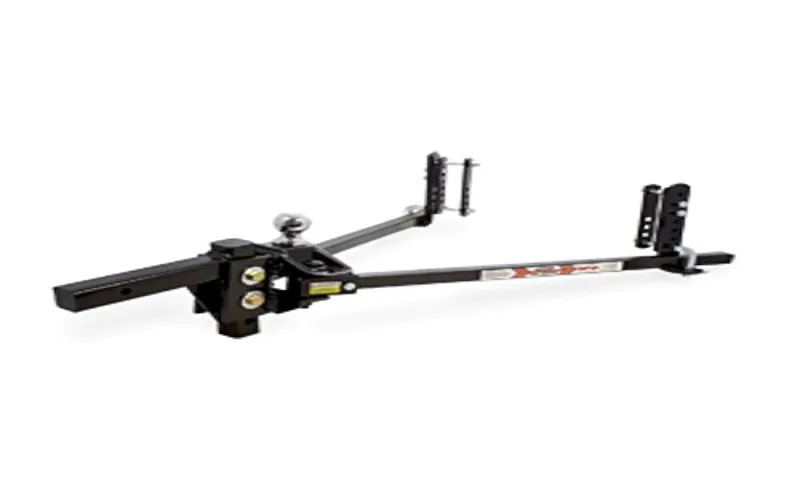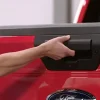Are you considering purchasing a trailer or RV? If so, you may have heard about the importance of using an equalizer hitch. But what exactly is an equalizer hitch, and do you really need one? An equalizer hitch, also known as a weight distribution hitch, is a device that helps evenly distribute the weight of the trailer or RV across both the vehicle and the trailer. This can greatly improve towing stability, making your overall towing experience safer and more comfortable.
Think of it like this: imagine you’re carrying a heavy backpack on one shoulder. It can be quite uncomfortable and may even throw off your balance. But if you were to evenly distribute the weight of the backpack across both shoulders, you would feel much more stable and balanced.
An equalizer hitch works in a similar way, distributing the weight of the trailer or RV evenly between the vehicle and the trailer axles. Not only does an equalizer hitch improve stability, but it also helps with weight control. By evenly distributing the weight, it can help prevent your vehicle from sagging and keep it level.
This is especially important if you’re towing a heavy load or if your vehicle has a lower suspension. However, whether or not you need an equalizer hitch ultimately depends on a few factors. The weight of your trailer, the towing capacity of your vehicle, and the type of terrain you’ll be towing on all play a role in determining if an equalizer hitch is necessary.
If you’re planning on towing a small trailer or RV on mostly flat terrain and your vehicle’s towing capacity exceeds the weight of the trailer, you may not necessarily need an equalizer hitch. However, if you’re towing a larger trailer or RV, or if you’ll be towing on hilly or uneven terrain, an equalizer hitch can greatly improve towing stability and safety. In conclusion, while an equalizer hitch is not always necessary, it can provide numerous benefits when towing a trailer or RV.
It improves stability, helps with weight distribution, and can make your towing experience safer and more comfortable. It’s important to consider the weight of your trailer, the towing capacity of your vehicle, and the type of terrain you’ll be towing on before making a decision. So, do you need an equalizer hitch? Evaluate your specific towing needs and make an informed decision based on what will give you the smoothest and safest towing experience possible.
Table of Contents
What is an Equalizer Hitch?
If you’re wondering whether or not you need an equalizer hitch, the answer depends on a few factors. An equalizer hitch is a type of towing device that helps distribute the weight of your trailer evenly across all four wheels of your towing vehicle. This can be especially useful if you are towing a heavy load or if your towing vehicle is smaller and lighter than your trailer.
One of the biggest advantages of using an equalizer hitch is that it helps to improve the stability and control of your towing setup. By evenly distributing the weight of the trailer, it helps to reduce the amount of sway and bounce that can occur while towing. This can greatly improve your towing experience and make it much safer on the road.
Another benefit of using an equalizer hitch is that it can help to prevent damage to your towing vehicle. When a trailer is not properly balanced, it can put excessive strain on the rear axle of your towing vehicle. Over time, this can lead to premature wear and tear on the vehicle’s suspension system and other mechanical components.
By using an equalizer hitch, you can help to alleviate this strain and prevent costly repairs down the line. So, do you need an equalizer hitch? It ultimately depends on the size and weight of your trailer, as well as your towing vehicle. If you’re towing a heavier load or if your towing vehicle is smaller and lighter, it’s definitely worth considering.
Talk to a towing expert or consult your vehicle’s owner’s manual for recommendations on the appropriate towing equipment for your specific setup. Ultimately, investing in an equalizer hitch can provide you with added safety and peace of mind while on the road.
Overview of how an equalizer hitch works
“equalizer hitch” An equalizer hitch is a device used for towing trailers that helps distribute the weight more evenly between the towing vehicle and the trailer. It is designed to eliminate the imbalances and swaying that can occur when towing a heavy load. The hitch consists of a weight distribution system and a sway control system.
The weight distribution system uses spring bars that are connected to both the trailer and the towing vehicle. These bars help to distribute the weight of the trailer evenly across both axles of the vehicle, reducing the strain on the rear axle. This not only improves the stability and handling of the vehicle but also prevents excessive wear and tear on the suspension and tires.
The sway control system, on the other hand, helps to minimize the swaying or fishtailing motion that can occur when towing a trailer. It uses friction or hydraulic resistance to counteract the side-to-side movement of the trailer and keep it stable. Overall, an equalizer hitch is an essential tool for anyone towing a heavy load, as it ensures a safer and more comfortable towing experience.

Explanation of the weight distribution and sway control features
Equalizer Hitch, weight distribution, sway control, features, explanation Have you ever experienced a bumpy and swaying ride when towing a trailer or caravan? It can be quite nerve-wracking and dangerous, not to mention the damage it can cause to your vehicle and the trailer itself. That’s where an Equalizer Hitch comes in. An Equalizer Hitch is a device designed to distribute the weight of the trailer evenly across the towing vehicle and the trailer itself.
It consists of a hitch assembly, spring bars, and sway control mechanisms. The weight distribution feature of an Equalizer Hitch works by transferring some of the tongue weight of the trailer to the front axle of the towing vehicle and the trailer’s axles. This helps to restore balance and stability to the whole setup, improving the overall towing experience.
Additionally, an Equalizer Hitch also comes with sway control features. Sway, or the side-to-side movement of the trailer, can be caused by various factors such as strong winds, passing vehicles, or improper weight distribution. The sway control mechanisms in an Equalizer Hitch help to counteract this movement and keep the trailer in line with the towing vehicle.
This greatly reduces the risk of accidents and makes the towing experience much safer and more enjoyable. In conclusion, an Equalizer Hitch is an essential tool for anyone who tows trailers or caravans. It provides weight distribution and sway control features that greatly improve the stability and safety of the towing setup.
So, the next time you hit the road with a trailer in tow, make sure you have an Equalizer Hitch installed to ensure a smooth and hassle-free journey.
When Do You Need an Equalizer Hitch?
So, you’re wondering if you need an equalizer hitch for your towing needs. Well, the answer really depends on a few factors. If you’re planning on towing a heavy trailer or load, especially if it’s a travel trailer or a fifth wheel, then an equalizer hitch can be a game-changer.
These hitches are designed to distribute the weight of the trailer evenly across your vehicle and trailer axles. This helps to ensure a smoother, more stable towing experience, reducing sway and improving overall control. Another factor to consider is the type of vehicle you have.
If you’re towing with a smaller vehicle, like a SUV or a light truck, an equalizer hitch can help level the playing field. These hitches can compensate for the weight difference between your vehicle and the trailer, making for a safer and more comfortable towing experience. Lastly, think about where you’ll be towing.
If you plan on towing in areas with steep inclines or declines, or if you’ll be encountering strong crosswinds, an equalizer hitch can make a big difference. They help to keep your trailer and vehicle aligned, reducing the chances of fishtailing or losing control. In conclusion, while not every towing situation requires an equalizer hitch, they can greatly improve the safety, stability, and control of your towing experience, especially if you’re towing a heavy load or using a smaller vehicle.
So, if you want peace of mind and a smoother ride, investing in an equalizer hitch may be worth it.
Determine if your trailer weight exceeds your vehicle’s towing capacity
equalizer hitch
Consider the weight distribution of your load and how it can affect your vehicle’s balance
equalizer hitch, weight distribution, load, vehicle balance The weight distribution of your load is an important factor to consider when it comes to your vehicle’s balance. This is where an equalizer hitch can come in handy. So when do you actually need an equalizer hitch? Well, it’s all about maintaining stability and control while towing.
If you have a heavy load or if the weight of your load is not evenly distributed, it can create an imbalance in your vehicle. This imbalance can lead to problems such as swaying, bouncing, or even loss of control. An equalizer hitch helps to distribute the weight of your load more evenly across both the towing vehicle and the trailer.
By doing so, it can improve the overall balance and stability, making your towing experience safer and more manageable. So whether you’re hauling a camper, a boat, or any other heavy load, it’s worth considering the benefits of using an equalizer hitch to ensure a smooth and controlled ride.
Evaluate if you frequently experience trailer sway or fishtailing while towing
equalizer hitch, trailer sway, fishtailing
The Benefits of Using an Equalizer Hitch
If you’re asking yourself, “do I need an equalizer hitch?” the answer is, it depends. An equalizer hitch, also known as a weight distribution hitch, can be a valuable tool for towing heavy trailers or RVs. Its main benefit is its ability to distribute the weight evenly across both the tow vehicle and the trailer, which can help improve stability and control while towing.
This is especially important if you’re towing a large, heavy trailer that has a significant amount of tongue weight. An equalizer hitch can help prevent the tow vehicle from sagging in the back, which can improve braking and steering performance. Additionally, it can help reduce the amount of sway or fishtailing that can occur when towing, making for a safer and more comfortable towing experience.
So, if you regularly tow heavy loads or are planning a long road trip with a trailer, investing in an equalizer hitch can be a smart choice to ensure both your safety and the safety of others on the road.
Improved stability and control while towing
equalizer hitch
Evenly distributed weight across all axles of the vehicle and trailer
equalizer hitch, evenly distributed weight, vehicle and trailer. When it comes to towing a trailer, it’s important to ensure that the weight is evenly distributed across all axles of both the vehicle and the trailer. This not only helps to improve stability and control while towing, but it also helps to prevent excessive wear and tear on the tires, suspension, and brakes.
One of the best ways to achieve this balanced weight distribution is by using an equalizer hitch. An equalizer hitch is designed to evenly distribute the weight of the trailer across all axles of the vehicle and trailer, thus ensuring a smoother and safer towing experience. It works by transferring some of the weight from the rear of the vehicle to the front axle, as well as distributing weight evenly between the left and right sides.
This helps to reduce swaying and bouncing, which can be especially dangerous when towing at high speeds or in windy conditions. In addition to improved stability and control, using an equalizer hitch also helps to improve the overall performance of your vehicle. By evenly distributing the weight, you can reduce the strain on the engine and suspension, resulting in better fuel efficiency and a smoother ride.
This can be especially beneficial if you frequently tow heavy trailers or if you often travel long distances. Another advantage of using an equalizer hitch is that it helps to minimize the wear and tear on both the vehicle and the trailer. When the weight is evenly distributed, it reduces the strain on the tires, suspension, and brakes, thus extending their lifespan.
This not only saves you money on maintenance and repairs but also helps to ensure that your vehicle and trailer are in optimal condition for longer periods of time. In conclusion, using an equalizer hitch offers a wide range of benefits when towing a trailer. From improved stability and control to better fuel efficiency and reduced wear and tear, it’s clear that investing in an equalizer hitch is a smart decision.
So, before you hit the road with your trailer, make sure to equip your vehicle with an equalizer hitch to ensure a safer and more enjoyable towing experience.
Reduced chance of trailer sway and fishtailing
Equalizer hitch, trailer sway, fishtailing, reduced chance. If you’ve ever towed a trailer, you know that trailer sway and fishtailing can be nerve-wracking and dangerous. That’s where an equalizer hitch comes in handy.
An equalizer hitch is designed to evenly distribute the weight of your trailer across all four wheels of your towing vehicle, reducing the chance of trailer sway and fishtailing. When you hit a bump or encounter strong winds, the equalizer hitch helps keep your trailer stable and prevents it from swaying or fishtailing out of control. This not only makes for a smoother and more comfortable towing experience, but also greatly reduces the risk of accidents on the road.
So why take chances? Invest in an equalizer hitch and enjoy a safer and more stable towing experience.
Improved braking performance
equalizer hitch, improved braking performance
Factors to Consider When Choosing an Equalizer Hitch
Are you wondering if you need an equalizer hitch for your towing needs? Well, the answer depends on a few factors. First and foremost, you need to consider the weight distribution of your trailer. A trailer with a heavy tongue weight can cause your vehicle to sag in the back, affecting its handling and braking abilities.
An equalizer hitch can help distribute the weight evenly between the trailer and the tow vehicle, resulting in a more stable and controlled towing experience. Additionally, if you frequently tow heavy loads or travel long distances, an equalizer hitch can provide added stability and reduce the strain on your vehicle’s suspension system. So, if you want to ensure a smoother and safer towing experience, investing in an equalizer hitch might be a wise decision.
Weight capacity of the hitch and matching it to your trailer and vehicle
When it comes to towing a trailer, one important aspect to consider is the weight capacity of the hitch. Choosing the right equalizer hitch involves considering several factors to ensure a safe and smooth towing experience. First, you need to determine the weight of your trailer and make sure it falls within the weight capacity of the hitch.
This capacity is typically listed in the hitch specifications. Keep in mind that exceeding the weight capacity can lead to instability and potential damage to your vehicle and trailer. Additionally, you should also consider the weight distribution of your trailer and how it affects the tongue weight.
The tongue weight should ideally be 10% to 15% of the total trailer weight, and an equalizer hitch can help distribute this weight evenly across the vehicle and trailer for better stability. Lastly, it’s important to match the weight capacity of the hitch with the towing capacity of your vehicle. This information can usually be found in the vehicle’s owner manual.
By considering these factors, you can choose an equalizer hitch that is the right fit for your trailer and vehicle, ensuring a safe and enjoyable towing experience.
Consider the ease of installation and adjustment
One important factor to consider when choosing an equalizer hitch is the ease of installation and adjustment. After all, you want to be able to easily set up and fine-tune your hitch system without any hassle. Look for a hitch that comes with clear instructions and is straightforward to install.
Some hitches even have innovative designs that make the installation process quicker and more convenient. Additionally, it’s essential to choose a hitch that allows for easy adjustment. This is crucial because you may need to make adjustments to ensure optimal weight distribution and leveling between your tow vehicle and trailer.
A hitch that offers simple and intuitive adjustment options will save you time and frustration when fine-tuning your setup. So remember to prioritize the ease of installation and adjustment when selecting an equalizer hitch for your towing needs.
Think about the maintenance and potential additional costs
When you’re selecting an equalizer hitch for your towing needs, it’s important to think about the long-term maintenance and potential additional costs. While some hitches may initially seem more affordable, they may require more upkeep or have hidden expenses down the line. Consider factors such as the materials used in the hitch and whether they are prone to rust or degradation.
Additionally, think about the potential need for lubrication or replacement parts over time. These maintenance tasks and expenses can add up, so it’s important to choose a hitch that not only meets your towing requirements but also fits your budget for the long haul. Remember, it’s not just about the upfront investment, but also the ongoing costs to keep your hitch in top shape.
By taking the time to think about these factors, you can make an informed decision that ensures both safety and affordability in the long run.
Conclusion
Do I need an equalizer hitch? Well, let me break it down for you in a clever and witty way. Picture this – you’re driving down the road, towing a trailer behind you. But wait, suddenly you feel like you’re on a roller coaster, with your vehicle and trailer bouncing up and down like a yo-yo.
Not exactly the smooth and stable ride you were hoping for, right? Enter the equalizer hitch, the hero of the towing world. It’s like having the perfect wingman by your side, ensuring that your vehicle and trailer are in sync, working together harmoniously like a well-rehearsed dance routine. No more bouncing, no more stress-induced white-knuckle driving.
Just a beautifully balanced and controlled towing experience. So, do you really need an equalizer hitch? Well, do you need a tailored suit for your business meeting? Do you need that extra shot of espresso to tackle the day? Just like these little enhancements make life easier and smoother, an equalizer hitch can make your towing experience a breeze. Think of it as a safety net for your trailer, preventing any sudden jerks or tilts that could put you in a hairy situation.
It’s like having the ultimate wingman who always has your back, ensuring that your journey is smooth and stress-free. But hey, if you’re the kind of person who enjoys the thrill of a bumpy ride and loves the challenge of trying to keep your vehicle and trailer in check, then maybe you can skip the equalizer hitch. But let’s be real, who wants to be sweating bullets and holding their breath every time they hit a pothole or a speed bump? In conclusion, while not everyone may need an equalizer hitch, it’s the smart and savvy choice for those who value stability, control, and a little extra peace of mind on their towing adventures.
So go ahead, invest in that wingman for your trailer, and enjoy the smoothest ride of your life!”
Summarize the key points discussed in the blog post and restate the importance of using an equalizer hitch when necessary
equalizer hitch, factors to consider, choosing an equalizer hitch In the blog post “Factors to Consider When Choosing an Equalizer Hitch,” we discussed the importance of using an equalizer hitch when necessary and highlighted some key factors to consider when choosing the right hitch for your towing needs. We emphasized the significance of using an equalizer hitch to improve stability, control, and overall towing performance. We also mentioned that the correct selection of an equalizer hitch is crucial to ensure the proper distribution of weight between the tow vehicle and the trailer, thus minimizing the risk of swaying and instability.
Other points covered in the post included the importance of considering the towing capacity, tongue weight, and type of trailer when choosing an equalizer hitch. By having an equalizer hitch that suits your specific towing needs, you can achieve a safer, smoother, and more comfortable towing experience.
FAQs
What is an equalizer hitch?
An equalizer hitch is a device used to distribute the weight of a trailer evenly across all axles of the towing vehicle, improving stability and control while towing.
Do I need an equalizer hitch for towing?
Whether or not you need an equalizer hitch depends on the weight of your trailer and the towing capacity of your vehicle. If your trailer exceeds a certain weight, typically around 5,000 pounds, it is recommended to use an equalizer hitch for improved safety and handling.
What are the benefits of using an equalizer hitch?
Using an equalizer hitch can provide several benefits, including improved stability and control while towing, reduced sway and bounce, and better weight distribution on the towing vehicle’s axles. It can also help mitigate the effects of crosswinds and passing vehicles.
How does an equalizer hitch work?
An equalizer hitch works by using tensioned spring bars or torsion bars to distribute the weight of the trailer across the towing vehicle’s axles. This helps maintain a more level ride and minimizes the impact of trailer weight on the rear suspension of the towing vehicle.
Can I use an equalizer hitch with any type of trailer?
Equalizer hitches are designed to be compatible with most types of trailers, including travel trailers, boat trailers, and utility trailers. However, it is important to determine the weight and tongue weight of your specific trailer to ensure compatibility with the hitch.
How do I choose the right equalizer hitch for my setup?
When choosing an equalizer hitch, factors to consider include the weight of your trailer, the tongue weight, and the towing capacity of your vehicle. It is recommended to consult with a professional or refer to the manufacturer’s guidelines to select the appropriate hitch for your specific setup.
Are there any maintenance requirements for an equalizer hitch?
Yes, regular maintenance of an equalizer hitch is important to ensure its continued performance and safety. This may include checking for proper tension and alignment, lubricating moving parts, and inspecting for any signs of wear or damage.



